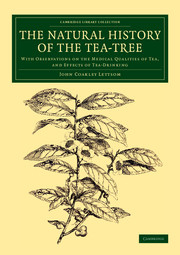
-
Select format
-
- Publisher:
- Cambridge University Press
- Publication date:
- June 2015
- March 2015
- ISBN:
- 9781316036198
- 9781108079815
- Dimensions:
- Weight & Pages:
- Dimensions:
- (297 x 210 mm)
- Weight & Pages:
- 0.24kg, 82 Pages
You may already have access via personal or institutional login
Book description
This treatise on the tea bush and the consumption of tea was published in 1772 by John Coakley Lettsom (1744–1815), a physician and philanthropist, whose first action on inheriting his family plantation in 1767 was to free all its slaves. He practised medicine in London, and wrote on topics which he felt would benefit society. The book begins with a description of the plant, using the Linnaean system, discussing tea cultivation and harvesting in China, and the preparation of the leaves for use locally and abroad. In Part II, Lettsom turns to the medical uses of tea, lamenting that so little scientific evidence exists for either its beneficent or its malign properties. After performing various experiments and considering the physical and social consequences of tea-drinking, he concludes that it should be avoided, because its enervating effects lead to weakness and effeminacy, advice which mostly fell on deaf ears.
Contents
Metrics
Full text views
Full text views help Loading metrics...
Loading metrics...
* Views captured on Cambridge Core between #date#. This data will be updated every 24 hours.
Usage data cannot currently be displayed.
Accessibility standard: Unknown
Why this information is here
This section outlines the accessibility features of this content - including support for screen readers, full keyboard navigation and high-contrast display options. This may not be relevant for you.
Accessibility Information
Accessibility compliance for the PDF of this book is currently unknown and may be updated in the future.


